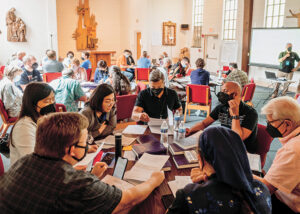I am not one of those people who says, “I’m not religious, I just love Jesus” or “I don’t belong to any denomination, I’m just a Christian.”
Rather, I have sometimes said, “Those who are sure of their unique convictions are often more open to genuine dialogue than those who accept all beliefs as equally valid.”
The latter really have little to offer to a dialogue, and by accepting everything uncritically, they thereby dismiss anyone who has strong convictions.
We all have traditions, backgrounds, biases, and peculiar perspectives, so we may as well acknowledge them. Perhaps by acknowledging them we will be more open to listen to others from other Christian traditions and even other religions.
I have no problem identifying my theological convictions as Anabaptist or Mennonite, but of course what that means is open to debate.
Although Anabaptists were given the derogatory nickname in the sixteenth century because of their peculiar practice of believer’s baptism, I propose that it is not necessarily this practice that is at the core of our identity today.
The practice of believer’s baptism in the sixteenth century was a way to outwardly signify an allegiance to another jurisdiction—the localized rule of Christ—than the Christendom Empire.
It was this allegiance to follow Christ in community, not the mere practice of applying water that was the hallmark of Anabaptism.
How do we best show our allegiance today? What does it mean to be an Anabaptist today?
Christendom is in various stages of crumbling in the western world so perhaps we need additional outward markers to identify our loyalty and commitment to the body of Christ, rather than the prevailing empires of militarism, consumerism and tribalism.
How do we collectively give witness to our commitment to pacifism, economic justice and inclusivity?
My creative action as a theologian is to reflect on how I teach Anabaptism to an increasingly ecumenical, interdenominational, ambivalent student body.
Anabaptists protested the hierarchy of popes and bishops in league with emperors and princes, and as a negative result, this movement has splintered into dozens of believers church denominations in subsequent centuries (Mennonites, Baptists, Brethren, Evangelical Free, Pentecostals, Alliance, Vineyard, etc.), not to mention all the independent “non-denominational” churches.
I say in class that I would rather have this mess than a neat and tidy hierarchy of oppression, but at the same time, we must consider Christian unity and our collective witness which is just as biblical (John 13:35; 17:20-23) as some of the distinctives (for example, believers baptism) that have caused our separation from others.
I will join with others to work for peace and justice—the hallmarks of the reign of Jesus.
Gareth Brandt lives in Abbotsford, B.C., where he teaches theology at Columbia Bible College and attends Emmanuel Mennonite Church. He blogs at garethbrandt.wordpress.com, where this post originally appeared.
LnRiLWdhbGxlcnkgdWx7bGlzdC1zdHlsZTpub25lO21hcmdpbjowIDAgMS41ZW0gMDtwYWRkaW5nOjB9LnRiLWdhbGxlcnlfX2NlbGx7bWFyZ2luOjAgIWltcG9ydGFudDtwb3NpdGlvbjpyZWxhdGl2ZX0udGItZ2FsbGVyeS0tZ3JpZHtkaXNwbGF5OmdyaWQ7Z3JpZC1hdXRvLXJvd3M6YXV0byAhaW1wb3J0YW50fS50Yi1nYWxsZXJ5LS1ncmlkOm5vdCgudGItZ2FsbGVyeS0tZ3JpZC0tbm9jcm9wKSAudGItYnJpY2tfX2NvbnRlbnR7aGVpZ2h0OjEwMCU7cG9zaXRpb246YWJzb2x1dGU7dG9wOjB9LnRiLWdhbGxlcnktLWdyaWQ6bm90KC50Yi1nYWxsZXJ5LS1ncmlkLS1ub2Nyb3ApIC50Yi1nYWxsZXJ5X19jZWxse2dyaWQtcm93LWVuZDp1bnNldCAhaW1wb3J0YW50O3Bvc2l0aW9uOnJlbGF0aXZlfS50Yi1nYWxsZXJ5LS1ncmlkOm5vdCgudGItZ2FsbGVyeS0tZ3JpZC0tbm9jcm9wKSAudGItZ2FsbGVyeV9fY2VsbDo6YmVmb3Jle2NvbnRlbnQ6IiI7ZGlzcGxheTppbmxpbmUtYmxvY2s7cGFkZGluZy1ib3R0b206MTAwJX0udGItZ2FsbGVyeS0tZ3JpZDpub3QoLnRiLWdhbGxlcnktLWdyaWQtLW5vY3JvcCkgLnRiLWdhbGxlcnlfX2NlbGw6Om1hcmtlcntjb250ZW50OiIifS50Yi1nYWxsZXJ5LS1ncmlkOm5vdCgudGItZ2FsbGVyeS0tZ3JpZC0tbm9jcm9wKSBpbWd7d2lkdGg6MTAwJTtoZWlnaHQ6MTAwJTstby1vYmplY3QtZml0OmNvdmVyO29iamVjdC1maXQ6Y292ZXJ9LnRiLWdhbGxlcnktLWdyaWQtLW5vY3JvcCBpbWd7aGVpZ2h0OmF1dG8gIWltcG9ydGFudDt3aWR0aDphdXRvICFpbXBvcnRhbnR9LnRiLWdhbGxlcnktLWdyaWQtLW5vY3JvcCAudGItZ2FsbGVyeV9fY2VsbHthbGlnbi1zZWxmOmVuZH0udGItZ2FsbGVyeS0tZ3JpZC0tbm9jcm9wIC50Yi1icmlja19fY29udGVudHtoZWlnaHQ6MTAwJX0udGItZ2FsbGVyeS0tY29sbGFnZXtkaXNwbGF5OmdyaWQ7Z3JpZC10ZW1wbGF0ZS1jb2x1bW5zOnJlcGVhdCgxMiwgMWZyKX0udGItZ2FsbGVyeS0tY29sbGFnZSAudGItYnJpY2tfX2NvbnRlbnR7aGVpZ2h0OjEwMCV9LnRiLWdhbGxlcnktLWNvbGxhZ2UgaW1ne2hlaWdodDoxMDAlICFpbXBvcnRhbnR9LnRiLWdhbGxlcnktLW1hc29ucnl7ZGlzcGxheTpncmlkO2dyaWQtcm93LWdhcDowO2dyaWQtYXV0by1yb3dzOjFweDtvcGFjaXR5OjB9LnRiLWdhbGxlcnktLW1hc29ucnkgLnRiLWJyaWNrX19jb250ZW50e3Bvc2l0aW9uOnJlbGF0aXZlfS50Yi1nYWxsZXJ5LS1tYXNvbnJ5IC50Yi1icmlja19fY29udGVudCBpbWcsLnRiLWdhbGxlcnktLW1hc29ucnkgLnRiLWJyaWNrX19jb250ZW50IGlmcmFtZSwudGItZ2FsbGVyeS0tbWFzb25yeSAudGItYnJpY2tfX2NvbnRlbnQgdmlkZW97LW8tb2JqZWN0LWZpdDpjb3ZlcjtvYmplY3QtZml0OmNvdmVyO3dpZHRoOjEwMCUgIWltcG9ydGFudDtkaXNwbGF5OmJsb2NrfS50Yi1nYWxsZXJ5X19jYXB0aW9ue3Bvc2l0aW9uOmFic29sdXRlO2JvdHRvbTowO3dpZHRoOjEwMCU7YmFja2dyb3VuZDpyZ2JhKDI1NSwyNTUsMjU1LDAuNik7cGFkZGluZzo1cHggMnB4O3RleHQtYWxpZ246Y2VudGVyO2NvbG9yOiMzMzN9LnRiLWdhbGxlcnlfX2NhcHRpb246ZW1wdHl7YmFja2dyb3VuZDp0cmFuc3BhcmVudCAhaW1wb3J0YW50fS50Yi1nYWxsZXJ5IC50Yi1icmlja19fY29udGVudCBmaWd1cmV7aGVpZ2h0OjEwMCV9LnRiLWdhbGxlcnkgaW1ne3dpZHRoOjEwMCU7aGVpZ2h0OjEwMCU7LW8tb2JqZWN0LWZpdDpjb3ZlcjtvYmplY3QtZml0OmNvdmVyO3ZlcnRpY2FsLWFsaWduOmJvdHRvbX0jbGVmdC1hcmVhIHVsLnRiLWdhbGxlcnl7bGlzdC1zdHlsZS10eXBlOm5vbmU7cGFkZGluZzowfSAudGItZ2FsbGVyeVtkYXRhLXRvb2xzZXQtYmxvY2tzLWdhbGxlcnk9IjNlZWVkM2JiODYyZDQ2YmI5ODgzNzI1NGZhZWZkYTc2Il0geyBtYXJnaW4tdG9wOiAzMHB4OyB9IC50Yi1nYWxsZXJ5W2RhdGEtdG9vbHNldC1ibG9ja3MtZ2FsbGVyeT0iM2VlZWQzYmI4NjJkNDZiYjk4ODM3MjU0ZmFlZmRhNzYiXSAudGItZ2FsbGVyeV9fY2FwdGlvbiB7IGJvdHRvbTogNXB4OyB9IC50Yi1nYWxsZXJ5W2RhdGEtdG9vbHNldC1ibG9ja3MtZ2FsbGVyeT0iM2VlZWQzYmI4NjJkNDZiYjk4ODM3MjU0ZmFlZmRhNzYiXSAudGItZ2FsbGVyeS0tbWFzb25yeSB7IGdyaWQtdGVtcGxhdGUtY29sdW1uczogbWlubWF4KDAsIDFmcikgbWlubWF4KDAsIDFmcikgbWlubWF4KDAsIDFmcik7Z3JpZC1jb2x1bW4tZ2FwOiA1cHg7IH0gLnRiLWdhbGxlcnlbZGF0YS10b29sc2V0LWJsb2Nrcy1nYWxsZXJ5PSIzZWVlZDNiYjg2MmQ0NmJiOTg4MzcyNTRmYWVmZGE3NiJdIC50Yi1nYWxsZXJ5LS1tYXNvbnJ5IC50Yi1icmlja19fY29udGVudCB7IHBhZGRpbmc6IDAgMCA1cHggMDsgfSBAbWVkaWEgb25seSBzY3JlZW4gYW5kIChtYXgtd2lkdGg6IDc4MXB4KSB7IC50Yi1nYWxsZXJ5IHVse2xpc3Qtc3R5bGU6bm9uZTttYXJnaW46MCAwIDEuNWVtIDA7cGFkZGluZzowfS50Yi1nYWxsZXJ5X19jZWxse21hcmdpbjowICFpbXBvcnRhbnQ7cG9zaXRpb246cmVsYXRpdmV9LnRiLWdhbGxlcnktLWdyaWR7ZGlzcGxheTpncmlkO2dyaWQtYXV0by1yb3dzOmF1dG8gIWltcG9ydGFudH0udGItZ2FsbGVyeS0tZ3JpZDpub3QoLnRiLWdhbGxlcnktLWdyaWQtLW5vY3JvcCkgLnRiLWJyaWNrX19jb250ZW50e2hlaWdodDoxMDAlO3Bvc2l0aW9uOmFic29sdXRlO3RvcDowfS50Yi1nYWxsZXJ5LS1ncmlkOm5vdCgudGItZ2FsbGVyeS0tZ3JpZC0tbm9jcm9wKSAudGItZ2FsbGVyeV9fY2VsbHtncmlkLXJvdy1lbmQ6dW5zZXQgIWltcG9ydGFudDtwb3NpdGlvbjpyZWxhdGl2ZX0udGItZ2FsbGVyeS0tZ3JpZDpub3QoLnRiLWdhbGxlcnktLWdyaWQtLW5vY3JvcCkgLnRiLWdhbGxlcnlfX2NlbGw6OmJlZm9yZXtjb250ZW50OiIiO2Rpc3BsYXk6aW5saW5lLWJsb2NrO3BhZGRpbmctYm90dG9tOjEwMCV9LnRiLWdhbGxlcnktLWdyaWQ6bm90KC50Yi1nYWxsZXJ5LS1ncmlkLS1ub2Nyb3ApIC50Yi1nYWxsZXJ5X19jZWxsOjptYXJrZXJ7Y29udGVudDoiIn0udGItZ2FsbGVyeS0tZ3JpZDpub3QoLnRiLWdhbGxlcnktLWdyaWQtLW5vY3JvcCkgaW1ne3dpZHRoOjEwMCU7aGVpZ2h0OjEwMCU7LW8tb2JqZWN0LWZpdDpjb3ZlcjtvYmplY3QtZml0OmNvdmVyfS50Yi1nYWxsZXJ5LS1ncmlkLS1ub2Nyb3AgaW1ne2hlaWdodDphdXRvICFpbXBvcnRhbnQ7d2lkdGg6YXV0byAhaW1wb3J0YW50fS50Yi1nYWxsZXJ5LS1ncmlkLS1ub2Nyb3AgLnRiLWdhbGxlcnlfX2NlbGx7YWxpZ24tc2VsZjplbmR9LnRiLWdhbGxlcnktLWdyaWQtLW5vY3JvcCAudGItYnJpY2tfX2NvbnRlbnR7aGVpZ2h0OjEwMCV9LnRiLWdhbGxlcnktLWNvbGxhZ2V7ZGlzcGxheTpncmlkO2dyaWQtdGVtcGxhdGUtY29sdW1uczpyZXBlYXQoMTIsIDFmcil9LnRiLWdhbGxlcnktLWNvbGxhZ2UgLnRiLWJyaWNrX19jb250ZW50e2hlaWdodDoxMDAlfS50Yi1nYWxsZXJ5LS1jb2xsYWdlIGltZ3toZWlnaHQ6MTAwJSAhaW1wb3J0YW50fS50Yi1nYWxsZXJ5LS1tYXNvbnJ5e2Rpc3BsYXk6Z3JpZDtncmlkLXJvdy1nYXA6MDtncmlkLWF1dG8tcm93czoxcHg7b3BhY2l0eTowfS50Yi1nYWxsZXJ5LS1tYXNvbnJ5IC50Yi1icmlja19fY29udGVudHtwb3NpdGlvbjpyZWxhdGl2ZX0udGItZ2FsbGVyeS0tbWFzb25yeSAudGItYnJpY2tfX2NvbnRlbnQgaW1nLC50Yi1nYWxsZXJ5LS1tYXNvbnJ5IC50Yi1icmlja19fY29udGVudCBpZnJhbWUsLnRiLWdhbGxlcnktLW1hc29ucnkgLnRiLWJyaWNrX19jb250ZW50IHZpZGVvey1vLW9iamVjdC1maXQ6Y292ZXI7b2JqZWN0LWZpdDpjb3Zlcjt3aWR0aDoxMDAlICFpbXBvcnRhbnQ7ZGlzcGxheTpibG9ja30udGItZ2FsbGVyeV9fY2FwdGlvbntwb3NpdGlvbjphYnNvbHV0ZTtib3R0b206MDt3aWR0aDoxMDAlO2JhY2tncm91bmQ6cmdiYSgyNTUsMjU1LDI1NSwwLjYpO3BhZGRpbmc6NXB4IDJweDt0ZXh0LWFsaWduOmNlbnRlcjtjb2xvcjojMzMzfS50Yi1nYWxsZXJ5X19jYXB0aW9uOmVtcHR5e2JhY2tncm91bmQ6dHJhbnNwYXJlbnQgIWltcG9ydGFudH0udGItZ2FsbGVyeSAudGItYnJpY2tfX2NvbnRlbnQgZmlndXJle2hlaWdodDoxMDAlfS50Yi1nYWxsZXJ5IGltZ3t3aWR0aDoxMDAlO2hlaWdodDoxMDAlOy1vLW9iamVjdC1maXQ6Y292ZXI7b2JqZWN0LWZpdDpjb3Zlcjt2ZXJ0aWNhbC1hbGlnbjpib3R0b219I2xlZnQtYXJlYSB1bC50Yi1nYWxsZXJ5e2xpc3Qtc3R5bGUtdHlwZTpub25lO3BhZGRpbmc6MH0gLnRiLWdhbGxlcnlbZGF0YS10b29sc2V0LWJsb2Nrcy1nYWxsZXJ5PSIzZWVlZDNiYjg2MmQ0NmJiOTg4MzcyNTRmYWVmZGE3NiJdIC50Yi1nYWxsZXJ5X19jYXB0aW9uIHsgYm90dG9tOiA1cHg7IH0gLnRiLWdhbGxlcnlbZGF0YS10b29sc2V0LWJsb2Nrcy1nYWxsZXJ5PSIzZWVlZDNiYjg2MmQ0NmJiOTg4MzcyNTRmYWVmZGE3NiJdIC50Yi1nYWxsZXJ5LS1tYXNvbnJ5IHsgZ3JpZC10ZW1wbGF0ZS1jb2x1bW5zOiBtaW5tYXgoMCwgMWZyKSBtaW5tYXgoMCwgMWZyKSBtaW5tYXgoMCwgMWZyKTtncmlkLWNvbHVtbi1nYXA6IDVweDsgfSAudGItZ2FsbGVyeVtkYXRhLXRvb2xzZXQtYmxvY2tzLWdhbGxlcnk9IjNlZWVkM2JiODYyZDQ2YmI5ODgzNzI1NGZhZWZkYTc2Il0gLnRiLWdhbGxlcnktLW1hc29ucnkgLnRiLWJyaWNrX19jb250ZW50IHsgcGFkZGluZzogMCAwIDVweCAwOyB9ICB9IEBtZWRpYSBvbmx5IHNjcmVlbiBhbmQgKG1heC13aWR0aDogNTk5cHgpIHsgLnRiLWdhbGxlcnkgdWx7bGlzdC1zdHlsZTpub25lO21hcmdpbjowIDAgMS41ZW0gMDtwYWRkaW5nOjB9LnRiLWdhbGxlcnlfX2NlbGx7bWFyZ2luOjAgIWltcG9ydGFudDtwb3NpdGlvbjpyZWxhdGl2ZX0udGItZ2FsbGVyeS0tZ3JpZHtkaXNwbGF5OmdyaWQ7Z3JpZC1hdXRvLXJvd3M6YXV0byAhaW1wb3J0YW50fS50Yi1nYWxsZXJ5LS1ncmlkOm5vdCgudGItZ2FsbGVyeS0tZ3JpZC0tbm9jcm9wKSAudGItYnJpY2tfX2NvbnRlbnR7aGVpZ2h0OjEwMCU7cG9zaXRpb246YWJzb2x1dGU7dG9wOjB9LnRiLWdhbGxlcnktLWdyaWQ6bm90KC50Yi1nYWxsZXJ5LS1ncmlkLS1ub2Nyb3ApIC50Yi1nYWxsZXJ5X19jZWxse2dyaWQtcm93LWVuZDp1bnNldCAhaW1wb3J0YW50O3Bvc2l0aW9uOnJlbGF0aXZlfS50Yi1nYWxsZXJ5LS1ncmlkOm5vdCgudGItZ2FsbGVyeS0tZ3JpZC0tbm9jcm9wKSAudGItZ2FsbGVyeV9fY2VsbDo6YmVmb3Jle2NvbnRlbnQ6IiI7ZGlzcGxheTppbmxpbmUtYmxvY2s7cGFkZGluZy1ib3R0b206MTAwJX0udGItZ2FsbGVyeS0tZ3JpZDpub3QoLnRiLWdhbGxlcnktLWdyaWQtLW5vY3JvcCkgLnRiLWdhbGxlcnlfX2NlbGw6Om1hcmtlcntjb250ZW50OiIifS50Yi1nYWxsZXJ5LS1ncmlkOm5vdCgudGItZ2FsbGVyeS0tZ3JpZC0tbm9jcm9wKSBpbWd7d2lkdGg6MTAwJTtoZWlnaHQ6MTAwJTstby1vYmplY3QtZml0OmNvdmVyO29iamVjdC1maXQ6Y292ZXJ9LnRiLWdhbGxlcnktLWdyaWQtLW5vY3JvcCBpbWd7aGVpZ2h0OmF1dG8gIWltcG9ydGFudDt3aWR0aDphdXRvICFpbXBvcnRhbnR9LnRiLWdhbGxlcnktLWdyaWQtLW5vY3JvcCAudGItZ2FsbGVyeV9fY2VsbHthbGlnbi1zZWxmOmVuZH0udGItZ2FsbGVyeS0tZ3JpZC0tbm9jcm9wIC50Yi1icmlja19fY29udGVudHtoZWlnaHQ6MTAwJX0udGItZ2FsbGVyeS0tY29sbGFnZXtkaXNwbGF5OmdyaWQ7Z3JpZC10ZW1wbGF0ZS1jb2x1bW5zOnJlcGVhdCgxMiwgMWZyKX0udGItZ2FsbGVyeS0tY29sbGFnZSAudGItYnJpY2tfX2NvbnRlbnR7aGVpZ2h0OjEwMCV9LnRiLWdhbGxlcnktLWNvbGxhZ2UgaW1ne2hlaWdodDoxMDAlICFpbXBvcnRhbnR9LnRiLWdhbGxlcnktLW1hc29ucnl7ZGlzcGxheTpncmlkO2dyaWQtcm93LWdhcDowO2dyaWQtYXV0by1yb3dzOjFweDtvcGFjaXR5OjB9LnRiLWdhbGxlcnktLW1hc29ucnkgLnRiLWJyaWNrX19jb250ZW50e3Bvc2l0aW9uOnJlbGF0aXZlfS50Yi1nYWxsZXJ5LS1tYXNvbnJ5IC50Yi1icmlja19fY29udGVudCBpbWcsLnRiLWdhbGxlcnktLW1hc29ucnkgLnRiLWJyaWNrX19jb250ZW50IGlmcmFtZSwudGItZ2FsbGVyeS0tbWFzb25yeSAudGItYnJpY2tfX2NvbnRlbnQgdmlkZW97LW8tb2JqZWN0LWZpdDpjb3ZlcjtvYmplY3QtZml0OmNvdmVyO3dpZHRoOjEwMCUgIWltcG9ydGFudDtkaXNwbGF5OmJsb2NrfS50Yi1nYWxsZXJ5X19jYXB0aW9ue3Bvc2l0aW9uOmFic29sdXRlO2JvdHRvbTowO3dpZHRoOjEwMCU7YmFja2dyb3VuZDpyZ2JhKDI1NSwyNTUsMjU1LDAuNik7cGFkZGluZzo1cHggMnB4O3RleHQtYWxpZ246Y2VudGVyO2NvbG9yOiMzMzN9LnRiLWdhbGxlcnlfX2NhcHRpb246ZW1wdHl7YmFja2dyb3VuZDp0cmFuc3BhcmVudCAhaW1wb3J0YW50fS50Yi1nYWxsZXJ5IC50Yi1icmlja19fY29udGVudCBmaWd1cmV7aGVpZ2h0OjEwMCV9LnRiLWdhbGxlcnkgaW1ne3dpZHRoOjEwMCU7aGVpZ2h0OjEwMCU7LW8tb2JqZWN0LWZpdDpjb3ZlcjtvYmplY3QtZml0OmNvdmVyO3ZlcnRpY2FsLWFsaWduOmJvdHRvbX0jbGVmdC1hcmVhIHVsLnRiLWdhbGxlcnl7bGlzdC1zdHlsZS10eXBlOm5vbmU7cGFkZGluZzowfSAudGItZ2FsbGVyeVtkYXRhLXRvb2xzZXQtYmxvY2tzLWdhbGxlcnk9IjNlZWVkM2JiODYyZDQ2YmI5ODgzNzI1NGZhZWZkYTc2Il0gLnRiLWdhbGxlcnlfX2NhcHRpb24geyBib3R0b206IDVweDsgfSAudGItZ2FsbGVyeVtkYXRhLXRvb2xzZXQtYmxvY2tzLWdhbGxlcnk9IjNlZWVkM2JiODYyZDQ2YmI5ODgzNzI1NGZhZWZkYTc2Il0gLnRiLWdhbGxlcnktLW1hc29ucnkgeyBncmlkLXRlbXBsYXRlLWNvbHVtbnM6IG1pbm1heCgwLCAxZnIpIG1pbm1heCgwLCAxZnIpIG1pbm1heCgwLCAxZnIpO2dyaWQtY29sdW1uLWdhcDogNXB4OyB9IC50Yi1nYWxsZXJ5W2RhdGEtdG9vbHNldC1ibG9ja3MtZ2FsbGVyeT0iM2VlZWQzYmI4NjJkNDZiYjk4ODM3MjU0ZmFlZmRhNzYiXSAudGItZ2FsbGVyeS0tbWFzb25yeSAudGItYnJpY2tfX2NvbnRlbnQgeyBwYWRkaW5nOiAwIDAgNXB4IDA7IH0gIH0g







7 Responses to “What does it mean to be Anabaptist today?”
What does it mean to be Anabaptist today?
The question, “What does it mean to be an Anabaptist today?” as answered by Gareth Brandt is an interesting example of secular Anabaptism. That is, an Anabaptism sheltered and secluded from other Anabaptist communions such as Mennonite Brethren, Evangelical Mennonite Church, Hutterite, BIC and God in Christ, Holdeman.
Secular Anabaptist thought uses as a talisman the term ‘Anabaptist’ it seems, without regard to the historical precedents, such as Franklin Littell’s thesis published in the Mennonite Quarterly Review circa 1947 identifying the Great Commission as the most quoted scripture by Anabaptists, as one example.
Similarly, it seems to have no reference to our worldwide Anabaptist communion as articulated in the Shared Convictions document.
Perhaps a more accurate description of this understanding of Anabaptism is: Gareth Brandt’s personal and private definition of Anabaptism.
What does it mean to be Anabaptist today?
Thank you, Gareth Brandt, for raising questions about what it means to be Anabaptist today. I hope that others will join the conversation with insights and questions. Perhaps some will suggest resources that would help all of us think carefully about this question.
I would like to suggest the following five statements as an elaboration of what it might mean “to follow Christ in community”:
1. We are seeking to be followers of Jesus in company with others in our time.
2. We join with others around an “endless conversation table” where each person’s story, each person’s stumbling along, each person’s perspective is given a voice for the benefit of all.
3. We affirm that our conversations are necessarily bounded by commitment to the Biblical canon, interpreted through Jesus.
4. While we are part of a movement that traces its roots to the 16th century, we are not interested in restoring 16th century Anabaptism. We want to build on the strengths of our heritage but not be restricted by it. Our goal is to go beyond insights and practices found useful earlier, adapting to the culture and challenges we face today. We are both “rooted” and “winged.”
5. We accept the reality of diverse understandings and life practices, and will rejoice in this diversity, refusing to insist on conformity, since the canon itself models diversity of conviction and practice and ongoing development over time.
What does it mean to be Anabaptist today?
Thank you, John, for articulating the presuppositions you seek to work with. This is helpful.
… the last part of your first affirmation ‘in our time’… fits precisely the classic Greek concept of secular: of this age.
… ‘endless conversation’ is precisely what some of us have experienced. Only those paid to go to meetings find endless conversation a positive affirmation. for those lay persons who pay to go to meetings, this is a costly venture which we long to have some conclusion with. Our joy comes in obedience to the mission of God, not in endlessly discussing.
…. thirdly, we agree as long as that interpretation is not a secular one. The church and its saints that have gone before also inform our conversation, commitments and, in some cases, boundaries.
… MC Canada/USA have been on a trajectory of accommodations since about 1860 in NA (an arbitrary date i recognize). That accommodation was benign, and even creative in some of its formulations. As culture has changed from Christendom (which Anabaptists sought to witness to and reform) to modernity and post-modernity, left wing Anabaptism (MC Canada/USA) has found itself accommodating to a culture and Christianity significantly at odds with core tenets. That accommodation is now causing significant internal inconsistencies. Some of us are of the conviction the accommodation has run its course and is now arid ground for Christian faith.
… and here, our Anabaptist brothers and sisters are calling us to stop and go another way. That is the choice today: Global Anabaptism or Secular Anabaptism.
Thanks for articulating the assumptions you work with, because it helps all of us understand and ultimately choose where we desire to go. It seems a significant majority are seeking to leave.
What does it mean to be Anabaptist today?
Correction: In the last sentence the word should be “minority” and not “majority.” …. a significant minority is seeking to….. I apologize for any misunderstanding that may have created.
What does it mean to be Anabaptist today?
Thanks, Walter, for your response to my five points, but I do question some of your assertions.
Since I said “followers of Jesus,” my use of “in our time” clearly refers to the present time, with no pressure to mean “secular.”
“Endless conversation” is the norm in Scripture and it is a gift, sometimes a burden. But essential for faithful progress.
As followers of the Way, we are always in process as long as we live. This was true for Israel as it dealt with e.g. the tension between exclusionary and inclusionary texts; and in the resolution of differing portrayals of God in the coming of Jesus. Acts tells of ongoing conversation within the church, e.g. Peter’s experience in Acts 10-11, and the Jerusalem Council in Acts 15.
The church then and now continues to wrestle with the meaning of Jesus’ good news in a given situation. This calls for ongoing conversations and discernment. In each situation the Body of Christ made adaptations in the light of new circumstances and challenges. I’m glad that similar things have continued: regarding slavery, regarding women in leadership, regarding biblical interpretation, etc.
When our conversation is bounded by the biblical canon as interpreted through Jesus, it is not going in a secular direction. As we engage with Scripture and each other and as we “read the moment,” new convictions and practices emerge, driven by the embryonic seed of the gospel.
What does it mean to be Anabaptist today?
Gareth Brandt asks the question, “What does it mean to be Anabaptist today?” Brandt would rather not identify as “just a Christian” and has no problem identifying his “theological convictions as Anabaptist or Mennonite,” however he is unsure as to what criteria should be used for such an identification/label.
Brandt changes the question to “how do we show our allegiance to follow Christ in community” today, and what role does Anabaptism play in that regard? He seems to be asking whether Anabaptist or Mennonite are still relevant “markers/identifiers” for Christians in a post-modern world. As a professor at Columbia Bible College and teacher of Anabaptist history, it seems Mr. Brandt is questioning the relevancy of his current teaching assignment.
Mr. Brandt regrets the fragmentation of the Anabaptist movement into dozens of splinter groups or “believers’ church denominations” over the intervening centuries since the Reformation. He suggests that collective Christianity has much to offer, perhaps as much or more than some of the distinctive markers of Anabaptist groups such as “believers baptism that have caused our separation from others.” For now, Mr. Brandt is content with the untidy mess of our history, and heartened at the opportunity to work toward the peace and justice mandate of Jesus.
Mr. Walter Bergen (CM 02/05/19) responds to Mr. Brandt’s musings, that perhaps Mr. Brandt has succumbed to a secularized Anabaptism separate from and secluded from other Anabaptist communions, or that perhaps Mr. Brandt’s “personal and private definition of Anabaptism” undergirds Brandt’s understanding of Anabaptism today. Mr. Bergen reminds the reader of historical precedents of being Anabaptist, namely Franklin H. Littell’s contention that the scripture of the Great Commission (Matthew 28), is “the most quoted scripture by Anabaptists” and presumably then a hallmark criteria of being Anabaptist. Littell, in “The Anabaptist View of the Church” (1958), perhaps makes a stronger argument for important qualities of the Anabaptist/Radical Reformers movement, namely that of the church’s return to “primitivism,” the emulation by Anabaptists of the early church of Christ and the Apostles as found in the book of Acts, etc.
In my understanding, early Anabaptists did indeed include a focus on a return to primitivism, trying to get back to living/being a church faithful to the example/teachings of Christ. This Anabaptist effort though was relatively short-lived. The 1527 Schleitheim Confession (Michael Sattler et al), included the seven articles concerning baptism, ex-communication, communion, separation from the world, pastors in the church, pacifism, and the swearing of oaths. The Confession also included Congregational Order #5, which stipulated that the believers would hold all things in common, that “none shall have anything of his own, rather, as Christians in the time of the apostles held all in common,” so too would the believer’s church. This was a definite move towards primitivism on the part of the Anabaptists, an attempt to live as Christ had enjoined the Apostles and subsequent believers to live.
Unfortunately in only a few generations (105 years), the more comprehensive 1632 Dordrecht Confession of Faith seems to include no mention of “holding all goods in common.” And by 1661, Thieleman van Bracht published his version of “The Martyr’s Mirror,” an effort by which he implores Anabaptists and Mennonites to turn from their apostasy of wealth and greed, and turn to living the life of Christ that the martyrs had died for.
The Anabaptist efforts at primitivism were lost in only a few generations, the efforts towards returning to the early Apostolic church was too difficult, and the primitivism was exchanged for the relatively more attainable Great Commission of Matthew, identified earlier by Mr. Bergen and seemingly interpreted as an instruction to “go and tell” about Jesus, rather than one of obeying Christ’s example. It seems to me the Anabaptist/Mennonite religious historical narrative is an adopted “go and tell” personalized salvation, which allows for the rationalization of wealth accumulation and empire building, which has tainted our past/present as seen in our sojourn through Prussia, Ukraine, Canada, USA, Paraguay, Bolivia, etc.
In a fine article entitled “Let’s let Jesus speak for himself,” published in the April 2019 edition of “The Mennonite,” Don Blosser, former professor at Goshen College, indicates that the interpretation of the Great Commission as a “go and tell” imperative is an erroneous one. Blosser contends that the Great Commission is absolutely not a “personal salvation” mandate, but rather an instruction to the Apostles to continue the ministry of Jesus, to act as Jesus did. Blosser indicates that the early Anabaptist question was not one of “Are you saved?” but rather one of “Are you following Jesus?” This understanding of early Anabaptism then has currency and relevancy today for us and fits in well with Gareth Brandt’s determination that there is nothing for him but to continue towards the peace and justice criteria as exemplified by the life of Jesus.
Perhaps my ramblings above do not adequately address Mr. Bergen’s contentions of the secular Anabaptism of Mennonite Church Canada, and the “accommodating to a culture and Christianity significantly at odds with core tenets” (CM 07/05/19). Mr. Bergen does well to call the church to account, to align itself as much as possible with Christ, if not necessarily Christianity. Mr. John H. Neufeld too, responds to Mr. Bergen’s identification of the negativity of a secular Christianity, and he too disavows any suggestion that the church is or should be “going in a secular direction” (CM 07/05/19).
I wonder if perhaps the binary presented by Mr. Bergen of secularism versus Christianity is somewhat misleading. We as humans cannot be other than a part of the secular world, and as such, the church too cannot but be influenced by the world it finds itself in. The early Anabaptists too, found it so difficult to stay the course of primitivism, and found themselves floundering only a few generations after the Reformation, subject to being only human in a world full of brokenness and confusion. So we too ask the question of ourselves raised by Gareth Brandt, “How do we best show our allegiance (to Christ) today” in a world where “Christendom is in various stages of crumbling?” We have to live in this secular world, that is not an option. We will be influenced by the world around us, and being in a secular world necessarily means that Christendom has always been in various stages of decay.
In his book “Stranger God: Meeting Jesus in Disguise (2017), Richard Beck, professor of psychology at Abilene Christian University and creator of the blog “Experimental Theology,” poses the question, “Who is Christ for us today?” Beck, in an exegesis of Dietrich Bonhoeffer’s “Letters from Prison,” contends along with Bonhoeffer that through our doctrinal/religiosity, our understanding of God becomes a false narrative, and it is only when we stand alongside the poor, the weak, the powerless in society, that we find ourselves walking with Christ. The adjectives of Anabaptist, Mennonite, and even Christian are concepts needing to be set aside, in favour of joining the poor, the weak, the powerless in their circumstances against injustice, and becoming church in the process.
The recent death of Jean Vanier, creator of L’ Arche Communities, is a fine example of seeking Christ in the marginalized of society. Vanier chose to abandon his naval career, and his potential academic career as a Doctor of Philosophy, instead opting to seek Christ in the intellectually challenged individuals in our society. In a 2015 interview in the UK magazine Premier Christianity, the interviewer asks Vanier why Vanier gave up his academic career and all its potential, to which Vanier replied, “I wanted to follow Jesus. There are some things you do without reasoning.” Vanier found the Jesus he was looking for in the marginalized people of this world.
It seems to me that the life of Christ provides sufficient example of what we are to do. I understand that we are to identify with the poor and marginalized in our society, just as Jesus did. There are reasons as to why various individuals and groups are marginalized in our society, be they intellectually disadvantaged persons, Indigenous persons, LBGTQ persons, or other individuals/groups we can identify as outsiders. I believe that we as followers of Christ, are to go to the marginalized in our society, stand with them, ask for their forgiveness, ask them how we should/could change, and ask them to help us to do so, in order that we too can one day find ourselves standing alongside of Jesus the Christ. That is one response to Gareth Brandt’s question of “How do we best show our allegiance (to Christ) today?” Perhaps Anabaptism has run its course, perhaps as John H. Neufeld contends, “while we are a part of a movement that traces its roots to the 16th century, we are not interested in restoring 16th century Anabaptism” (CM 05/05/19).
Thanks for now
Peter Reimer
Gretna, Manitoba
Being Anabaptist today
Thank you, Peter Reimer, for this very thoughtful and challenging response to Gareth Brandt’s article and Walter Bergen’s responses, and for bringing some thoughts of Don Blosser, Richard Beck and Jean Vanier into the conversation. I find your synthesis very helpful.